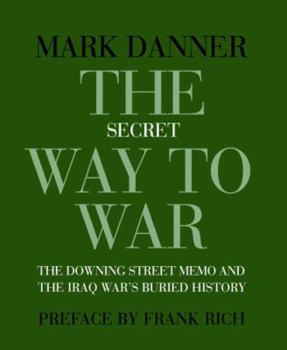The Secret Way to War: The Downing Street Memo and the Iraq War's Buried History
Select Format
Select Condition 
Book Overview
The United States went to war in Iraq to eliminate the threat from Saddam Hussein's weapons of mass destruction--which turned out not to exist. As the war drags on, the strange case of the weapons... This description may be from another edition of this product.
Format:Paperback
Language:English
ISBN:1590172078
ISBN13:9781590172070
Release Date:April 2006
Publisher:New York Review of Books
Length:176 Pages
Weight:0.40 lbs.
Dimensions:0.6" x 6.1" x 7.0"
Customer Reviews
4 ratings
Concise & informative
Published by Thriftbooks.com User , 17 years ago
This is a good book to read for information on the Downing Street memo--there was not enough press coverage on this, so I am glad this book was published.
The Downing Street Memo
Published by Thriftbooks.com User , 18 years ago
Mr. Danner's pamphlet was easy to read, concise and informative on a subject about which all Americans should be better informed.
Creating Imperial Reality
Published by Thriftbooks.com User , 18 years ago
In its June 9, 2005, issue The New York Review of Books published an article entitled "The Secret Way to War" in which Mark Danner reviewed and interpreted the recently released secret memo summarizing the main points of a meeting between British Prime Minister Tony Blair, cabinet members, and senior government officials held at 10 Downing Street on July 23, 2002. The book reprints this article as well as critical letters by Knight Ridder Bureau Chief John Walcott and Los Angeles Times reporter Michael Kinsley with the author's response to each. The author adds an afterword and an appendix containing the full text of the Downing Street Memo and seven other British documents pertaining to it. Danner makes three main points. First, it is clear that the Bush administration had decided to go to war with Iraq eight months before the actual March 19, 2003, attack. Second, from that point the Bush administration set out to "fix" the intelligence to build the strongest argument for war. Third, the Bush administration manipulated the weapons inspections to find a pretext for war even when claiming to use them as a way to avoid war. Danner distinguishes between the possible reasons the Bush administration wanted to go to war with Iraq ("to remove the threat a hostile and unpredictable dictator was thought to pose . . . to the industrial world's oil supply; to foreclose the possibility of any collaboration between Saddam and al-Qaeda . . .; to do away with a regime hostile to Israel; [and/or] to begin a process of limited `democratization' in the countries of the Middle East") from the pretexts for going to war (self-defense, humanitarian intervention, or violation of UN Security Council resolutions demanding that Iraq cease its programs involving atomic, biological, and chemical weapons.) Since Iraq clearly was not a threat to the United States and since this was not a case of humanitarian intervention, the US, with British cooperation, based its case on Iraq's nuclear weapons program. The two governments hoped that Saddam Hussein would resist inspections giving the Security Council grounds for authorizing military intervention. When Hussein surprised them by letting the inspectors in, and when the inspectors found nothing, the United States went to war before the inspectors could finish their job. Most disturbing is Danner's comparison of Joseph Goebels to an unnamed senior advisor to President Bush. Goebels claimed there was no point in trying to convert intellectuals because they would always yield to "the man in the street." "Arguments must therefore be crude, clear and forcible, and appeal to emotions and instincts, not the intellect. Truth was unimportant and entirely subordinate to tactics and psychology." Speaking to a New York Times Magazine Reporter, the Bush advisor contrasted "the reality-based community" (people who believe that solutions emerge from the judicious study of discernable reality) with the way things work now. "We
The mechanisms of manipulation
Published by Thriftbooks.com User , 18 years ago
If you have missed Mark Danner's articles on the Downing Street Memo in _The New York Review of Books_, here is your chance to learn a little more about the beginning of the war and how, in political thinking, the (wished for) effect can precede the (invented) cause. This book is particularly enlightening now, when the withdrawal of the American military from Iraq finally begins to be discussed. We are told that a withdrawal -- even a gradual and well-planned one - will eventually lead to terrorist attacks on America. Where is the proof? Mark Danner's book reveals the mechanisms of manipulation of public opinion behind this war: we are made to listen to Fear, not to Reason. To be sure, Reason makes mistakes, but Blind Fear's mistakes can be disastrous.






